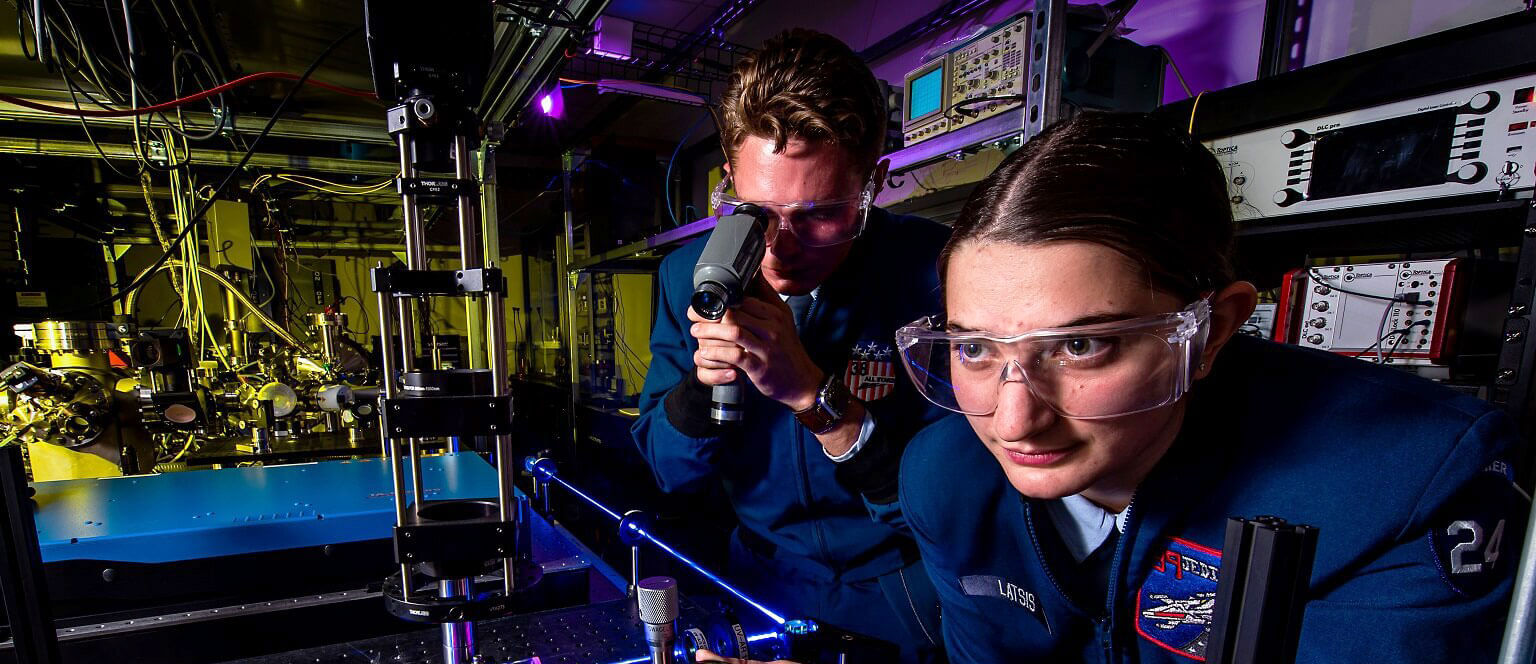Physics

Our modern military owes its technological superiority to great physicists. The U.S. Air Force Academy’s Physics program produces scientifically literate leaders of character, capable of navigating our armed forces through the increasingly complex obstacles our nation faces. In the study of physics, cadets develop the knowledge, skills and persistence necessary to solve unforeseen, abstract, complex and ill-defined problems. Our graduates enter active duty confident in their ability to adapt and overcome the many “unknowns” for which they’ll be responsible during their service – from STEM research to piloting aircraft.
A Physics degree is the only path to becoming an Air Force physicist (Air Force Specialty Code 61D). Most 61Ds are assigned to work cutting-edge research and development projects and next-generation weapons system acquisition programs under Air Force Materiel Command, Air Force Space Command, Air Force Special Operations Command, and other major commands. These assignments may include experimental design and data analysis, launching new satellites, briefing members of Congress, and fielding state-of-the-art technologies. The Air Force depends critically on 61Ds for their scientific expertise, critical thinking skills, fresh perspectives, and new ideas applied to the nation’s toughest (and often highly classified) technical challenges in the pursuit of maintaining the United States’ air, space and cyberspace dominance for decades to come.
Physics students have opportunities to participate in world-class scientific research and participate in summer research at the Department of Defense, Department of Energy, NASA or other laboratories around the country. Graduates also have a wide variety of graduate school scholarships and sponsorship available to them.
Potential Assignments
Within the Air Force
|
Outside the Air Force
|
SAMPLE COURSES
- Electromagnetic Theory
- Laboratory Techniques
- Nuclear Weapons Engineering
- Quantum Mechanics
- Lasers and Optics
- Astrophysics
SUGGESTED COURSE SEQUENCE
| 4-DEGREE (FRESHMAN) | 3-DEGREE (SOPHOMORE) | 2-DEGREE (JUNIOR) | FIRSTIE (SENIOR) |
|---|---|---|---|
| Beh Sci 110 Chem 100 Com Sci 110 English 111 For Lang 1 For Lang 2 History 100 Math 141 Math 142 Physics 110 |
Chem 200 Econ 201 English 211 Mech Engr 220 Math 243 Math 245 MSS 251 Physics 215 Physics 264 Physics 291 Pol Sci 211 |
Adv Open Option Aero Engr 315 ECE 315 History 300 Law 220 Math 346 Math 356 Physics 341 Physics 355 Physics 356 Physics 361 Physics 362 |
Adv Socio-Cultural Option Astro Engr 310 English 411 Philos 310 Physics 405 Physics 421 Physics 465 Physics 490 Physics Concentration Physics Concentration Physics Concentration Soc Sci 311 |
VALIDATION AND TRANSFER CREDITS
Cadets can validate Physics I through the department placement test or by receiving a 4 or 5 on the AP Physics C: Mechanics exam. Cadets can validate Physics II through the department placement test or by receiving a 4 or 5 on the AP Physics C: Electricity and Magnetism exam.
Cadets can receive transfer credits for Physics I/Physics II if they complete a comparable calculus-based and lab-based physics course at an accredited college or university with a grade of A or B. Other requests for transfer credit will be considered on a case-by-case basis by the department.
STEM Outreach
Our department is actively engaged in STEM outreach. The following cadet-run clubs provide a unique opportunity for USAFA to engage the local community. Cadets and faculty motivate K-12 students to partake in STEM by assisting in local science fairs and running demonstrations at nearby schools and museums.
Physics is Phun
Captain Kaitlin Poole at (719) 333-0869
Captain Rodney Carmona at (719) 333-3615
Physics and Astronomy
Lieutenant Colonel Benjamin Roth at (719) 333-6326
Interested community members from schools and other non-profit organizations should visit the STEM Outreach webpage. For cadets interested in starting the Meteorology Club, contact the Department of Physics.
CONTACT US
Dr. Alina Gearba-Sell
mirela.gearba-sell@afacademy.af.edu
Professor of Physics
(719) 333-3272